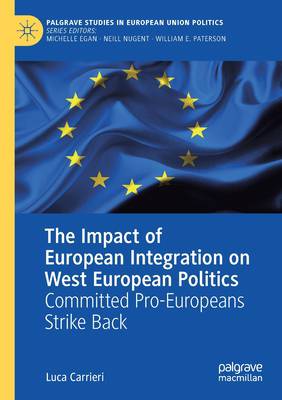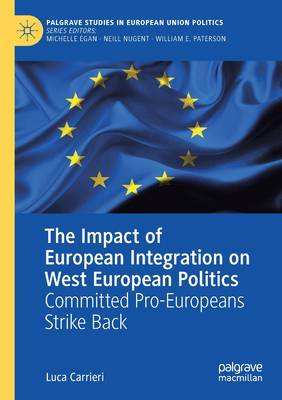
- Afhalen na 1 uur in een winkel met voorraad
- Gratis thuislevering in België vanaf € 30
- Ruim aanbod met 7 miljoen producten
- Afhalen na 1 uur in een winkel met voorraad
- Gratis thuislevering in België vanaf € 30
- Ruim aanbod met 7 miljoen producten
Zoeken
The Impact of European Integration on West European Politics
Committed Pro-Europeans Strike Back
Luca Carrieri
€ 94,95
+ 189 punten
Uitvoering
Omschrijving
This book analyses emerging trends in the politicisation of EU conflicts in Western Europe between 2006 and 2019, evaluating the transformative effects arising from multiple crises - the Euro crisis, the migration crisis and the Brexit Referendum. It describes how EU issues have been increasingly emphasised and polarised by various political parties - both the mainstream pro-EU and anti-EU protest parties - and have been transformed into more meaningful determinants of voting. The respective chapters investigate the fluctuations in EU issue entrepreneurship and EU issue voting, identifying which party types have been more likely to benefit from their EU issue proximity to voters, and assessing the growing politicisation of the EU conflict in both South European and North-Western countries. This book will be of particular interest to students and scholars of political parties, European politics, Euroscepticism and voting behaviour.
Specificaties
Betrokkenen
- Auteur(s):
- Uitgeverij:
Inhoud
- Aantal bladzijden:
- 236
- Taal:
- Engels
- Reeks:
Eigenschappen
- Productcode (EAN):
- 9783030481056
- Verschijningsdatum:
- 28/10/2021
- Uitvoering:
- Paperback
- Formaat:
- Trade paperback (VS)
- Afmetingen:
- 148 mm x 210 mm
- Gewicht:
- 335 g

Alleen bij Standaard Boekhandel
+ 189 punten op je klantenkaart van Standaard Boekhandel
Beoordelingen
We publiceren alleen reviews die voldoen aan de voorwaarden voor reviews. Bekijk onze voorwaarden voor reviews.











